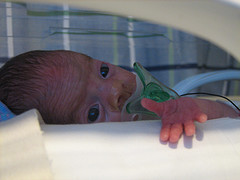You're all going to get tired of Andrea thrashing around about the Catholic Church. The way I know this is that
I'm tired of it. But here we are again. Certainly over the past few weeks there have been some interesting developments. I find myself in the peculiar position of worrying and fretting about the Church I love -actually hating some of the things that are happening- while defending it to people whose sole source of information about it is the Chicago Tribune or NPR. It's enough to make my brain hurt.
Flash back to the last Presidential election. Remember that then-Cardinal Ratzinger tried to deny John Kerry (well, not John Kerry by
name, but clearly by intent) Communion. Communion must, he claims, be denied to Catholic politicians who support legal abortion.(Try this link for more information:
National Catholic Reporter.) Interestingly, this private memo only went to American bishops. I could have sworn we had a universal church, but maybe that was just me -and it's a story for another time, anyway. The American bishops didn't go as far as Ratzinger wanted them to go. They decided in the end not to explicitly ban pro-choice politicians from Communion and to choose dialogue as the way to change people's hearts and minds on the subject. Of course, that was less controversial and news-worthy, so people don't know that was the outcome. But clearly, we do have Catholic bishops wishing that Catholic politicians would toe the conservative line a little better. (Here's the documentation:
U.S. Conference of Catholic Bishops.)
Possibly, that wishing is intensifying. One American Catholic Bishop, Robert Vasa of Oregon, wants to convene a task force to discuss the possibility that pro-choice Catholics are actually in heresy. The word heresy gets tossed around a lot and carelessly. It's actually a technical term; not every theological mistake or willed error is heretical. And the consequences of defining something and someone to be heretical are significant. Vasa wants to discuss the question of whether or not there's a "right to murder" heresy. He is
so walking into a theological nightmare. And he deserves it, so I'm not going to feel sorry for him when it happens. If there's a right to murder heresy, then Catholics have to be pacifists -which isn't true. Then Catholics must reject the death penalty, which they're already supposed to do, but don't, in large measure. Are bishops really going to enforce the consequences of heresy on all the Catholics who haven't quite come around on the death penalty question? He's not going to end up with what he wants, which is an ecclesiological law controlling the sexual behavior of women. (The full text of his letter is here:
Catholic Sentinel.)
OK, so bishops want the Catholics in public life and just those of in the pews to settle down and behave and be nice, polite, biddable Catholics. But Catholic politicians are also going after Catholic bishops. This is starting to get interesting.
Peter King, a Catholic Representative, has decided that it's "God's work" to make it a felony to knowingly aid an illegal immigrant. (Try this link for more information:
NY Times.) Of course, Catholic social service agencies and parishes have important roles in working with refugees and immigrants, legal or not. And Cardinal Mahoney (and others) preached eloquent Ash Wednesday sermons on making room at the table for everyone. (The text of the sermon is here:
A Place at the Table.) The Cardinals and Bishops aren't willing to give up the Church's social justice mission just because Peter King has decided that tough immigration proposals sell. King claims that those of us who disagree with him are "politically correct liberals". Is that a bad thing? And besides, the argument that Cardinal Mahoney is a politically correct liberal isn't going to hang together very long.
Here's my preliminary assessment. The Catholic Church's intellectual and theological underpinnings are vast and messy and difficult. Or, if you prefer, they are rich and varied. Even the smart and well-educated among us don't have a complete understanding of the ins and outs of it all. I've done better than some, because it's interesting to me, but there's no way I would ever claim to have mastered it. In fact, I completely ignore huge sections of Catholicism, either because they irritate me or because I'm not interested. Marian theology, hagiography in general, mystics in particular.... it's not hard to come up with a long list of stuff I know nothing much about. So, faced with more information than we can fully understand, we reduce it in order to control it.
The Bishops do that. They want to save babies, control women, and distract us from the pedophilia crisis, so they run around waving the anti-abortion flag. That's a valid part of Catholicism's teaching, but it's simplistic to focus on just the easy (for them) parts. Rep. King does the same thing. He doesn't like the Church's social justice teaching; he wants it just to be about liturgy, perhaps (or whatever it is he likes about the church). I would like to tell you that I don't do it, but I do. I want the church to be about social justice and community building and liberation. Leave me alone, if you please, about personal sin and nit-picky (to my way of thinking) rules about how often I need to go to confession.
Could there EVER be a way to sit down with Catholics who are drawn to the things I don't like about the church and find a way to explain to each other what we love? Could a conservative Catholic hear me about, say, feminist theology or inclusive language? Not to be convinced necessarily, but just to be able to say, "I see"? Could I hear a conservative Catholic about why rules and regulations are valuable and affirm the same "I see now"? I don't know. I really don't. But until we can, I suppose there's little wonder that people outside the church don't understand it.










